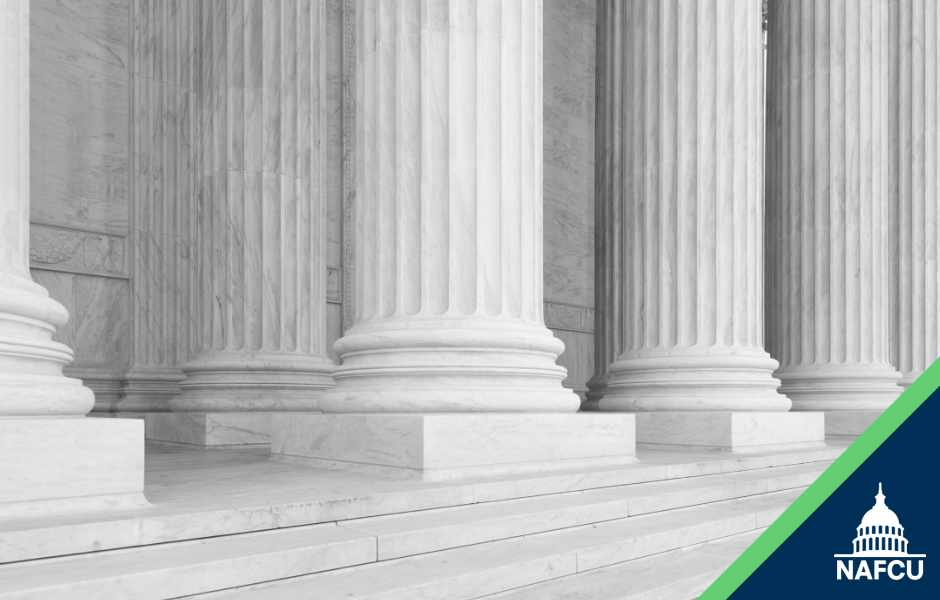Newsroom
NAFCU, CUNA, VACUL file amicus brief in payments fraud case

NAFCU, CUNA, and the Virginia Credit Union League (VACUL) filed a joint amicus brief Tuesday in the 4th Circuit Court Appeals case, Studco Buildings Systems v. 1st Advantage Federal Credit Union. At the center of the case is a rapidly growing and increasingly costly type of fraud – a business email compromise used to fraudulently misdirect payments via ACH.
In the brief, the associations highlight the regulatory burdens credit unions face and the clear indication that reducing those burdens would benefit the 138 million Americans who use credit unions for their financial services needs. A 2017 survey of credit union CEOs asking where they would reallocate funds earmarked for regulation, many of the respondents focused on items that would increase member benefits.
“Credit unions support their members but there must be a limit to liability for fraud that is out of the credit union’s control,” said NAFCU President and CEO Dan Berger, CUNA President and CEO Jim Nussle, and VACUL President and CEO Carrie Hunt in a joint statement. “We maintain that the judge got it wrong in this case. Financial institutions rely on automation to sort through billions of ACH transactions each year. For perspective, some 30 billion payments moved through the ACH network operators in 2022. While the ACH system is designed to flag transactions that warrant closer scrutiny, it is unrealistic to think any financial institution handling a significant volume of ACH transactions can manually monitor fraud. While fraud is on the rise and unfortunate, credit unions cannot be held accountable for events out of their control. Our financial system would collapse if that were the case.”
The groups pointed out there are critical policy questions at the heart of the case that warrant the attention of every credit union, including protecting the ability to rely on automation to make possible the processing of payments across a wide number of platforms. This case is further evidence of the growing legal threats to financial institutions, including frivolous lawsuits, issues arising from the expansion of the depth and breadth of regulation, and the challenges presented by technology and fraud.
Stay tuned to NAFCU Today for updates on this case as they become available.
Share This
Related Resources
Add to Calendar 2024-06-26 14:00:00 2024-06-26 14:00:00 Gallagher Executive Compensation and Benefits Survey About the Webinar The webinar will share trends in executive pay increases, annual bonuses, and nonqualified benefit plans. Learn how to use the data charts as well as make this data actionable in order to improve your retention strategy. You’ll hear directly from the survey project manager on how to maximize the data points to gain a competitive edge in the market. Key findings on: Total compensation by asset size Nonqualified benefit plans Bonus targets and metrics Prerequisites Demographics Board expenses Watch On-Demand Web NAFCU digital@nafcu.org America/New_York public
Gallagher Executive Compensation and Benefits Survey
preferred partner
Gallagher
Webinar
Add to Calendar 2024-06-21 09:00:00 2024-06-21 09:00:00 The Evolving Role of the CISO in Credit Unions Listen On: Key Takeaways: [01:30] Being able to properly implement risk management decisions, especially in the cyber age we live in, is incredibly important so CISOs have a lot of challenges here. [02:27] Having a leader who can really communicate cyber risks and understand how ready that institution is to deal with cyber events is incredibly important. [05:36] We need to be talking about risk openly. We need to be documenting and really understanding what remediating risk looks like and how you do that strategically. [16:38] Governance, risk, compliance, and adherence to regulatory controls are all being looked at much more closely. You are also seeing other technology that is coming into the fold directly responsible for helping CISOs navigate those waters. [18:28] The reaction from the governing bodies is directly related to the needs of the position. They’re trying to help make sure that we are positioned in a way that gets us the most possibility of success, maturing our postures and protecting the institutions. Web NAFCU digital@nafcu.org America/New_York public
The Evolving Role of the CISO in Credit Unions
preferred partner
DefenseStorm
Podcast
AI in Action: Redefining Disaster Preparedness and Financial Security
Strategy
preferred partner
Allied Solutions
Blog Post
Get daily updates.
Subscribe to NAFCU today.
